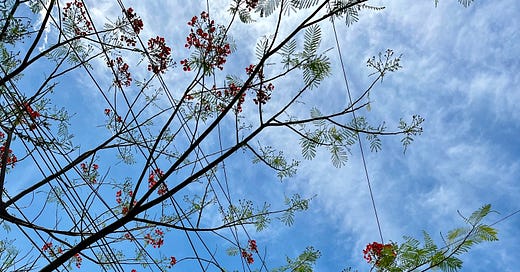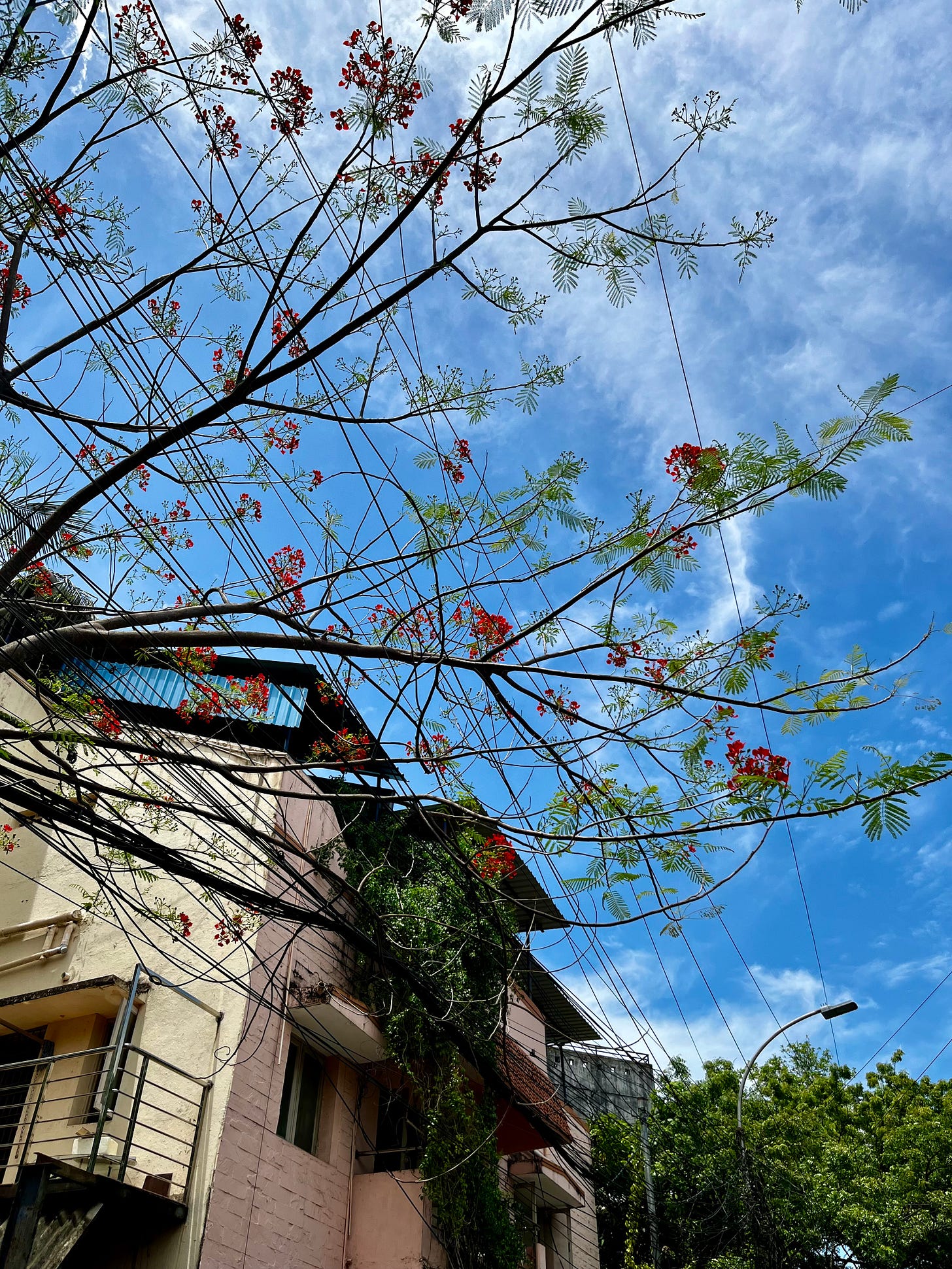Hello old and new subscribers—welcome! If you like this newsletter, follow 💌shelfoffering on Instagram, share, and consider becoming a paid subscriber.
My earliest memory of writing something down is a cheesy love poem alongside a crude sketch of the person I was crushing on when I was 13. The diary is small with a hard black cover, enveloped in colourful squiggly lines. I have duly filled out the first few pages with my name and personal details, and filled out the directory with the phone numbers of my classmates. Looking back, I cannot believe that the other girls were happy to give me their residential phone numbers considering how much they hated me and how much we all hated each other.
My earliest memory of reading something is much earlier. I remember crouching in my white cotton shimmy1 near a steel green bureau, cautiously reading Art Buchwald and being on the lookout for my father who had already warned me against reading it. You’re not an adult, you should not be reading this. Once you’re older, they’re yours. I remember him pointing to a cardboard box of books — a few Dean Koontz, Frank Herbert’s Dune, a Gore Vidal one that I don’t remember, some Frederick Forsyth titles, Truman Capote’s In Cold Blood, and maybe one John Le Carre apart from a good number of Sidney Sheldons. When I read Buchwald over a week of lethargic summer afternoons, I was no more than 13 and no younger than 10. I don’t recall any comprehension but I remember looking up words constantly in a blue pocket dictionary. That summer came to define my obsession with meaning and etymology2; I was constantly reading the blue dictionary as soon as I woke up, while eating lunch, and before going to bed. I still do it sometimes: look up strange words composed through all too familiar letters, searching for clues that give away anything meaningful so I can string them all together into an embellishment that shines light onto irreproducible memories.
I’ve been trying to unearth a few good things from what I’ve buried within and it’s funny because good things shouldn’t have to be buried. They have to burst forth. Or at least gently float to the top. I guess memory is like that — malleable putty to help reconstruct the past but not concrete enough to render it reliable.
For my master’s degree dissertation, I wrote about mangoes, migrants, and memory in home building and identity making, talking to immigrants in South Asian grocery stores, reading Pierre Nora on memory and history and Sutton on the memory of eating (among other academicians) and trying to understand that food elicits more than individual nostalgia; that it helps in the social construction of memory. To embody memory in terms of materiality, it is simply the concept of time. But altogether, memory is life — ceaselessly evolving and constantly dying, by remembering and forgetting, creating and destroying, weaving and disentangling.
I have trouble disentangling sometimes, consciousness filling up the vista of a domiciled, reconfigured mind. But there is awareness. Along with it, a foldable red satin purse that I remember losing on a bus in Chennai. Inside that purse is a photo of my favourite cricketer from childhood that I likely stole from a grocery shop because it was lying unbothered near the till. It was a freebie for something, maybe a pack of glucose biscuits or a tub of deep maroon jam, that was ultimately unclaimed. So I tucked it inside the purse’s sleeve, retrieving the photo every few minutes and looking at it fondly in a kind of sickening maternalism. The photo belonged to me even if by stealth.
When I probe this memory closely, it’s broad daylight. I’m standing inside the bus and holding onto a vertical railing. I turn around and everything is suddenly grey and lifeless, pithy and pale. I no longer have the purse and instead I’m holding an ice cream cone that’s dripping down to my fingers. I look down and I’m sitting on a pavement while someone I know is on my scooter eating a choco ice. We’re laughing about something and to our right are stacks of plastic crates with bags of milk (Aavin, Heritage, Aarokya). We finish our ice creams and take the scooter back home. The red purse has disappeared along with my memories of it.
Now that I’ve ransacked my brain for memories, I’ve been struggling for a structure. You know, the string that ties everything up but only stronger, like a cantilever bridge that holds on one end, with the other being this newsletter, so you, the reader, can read about my life laid bare, and I, the writer, can test this literary form.
My first instance of pulling sentences together, which felt like lining up balloons in the air so they’re graceful for at least one moment, was when I was 16 or 18. No, actually 15. It was for a short story contest held within my school and the prize was a half day’s field trip to a living history museum preserving the architecture of South India. There were four winners and I was one of them. I wrote about family politics and memory, about stubborn women and rigid fathers, the metamorphosis from childhood to adolescence, disappointment and sorrow, and, of course, small joys, in equal measures. Others wrote about popular girls in school and their knottiness, young love and first kisses, travels to foreign lands, and about the museum itself in an act of sheer grovelling. My story no longer survives—because it was handwritten on an A4 sheet—but their remnants float gently, in and around me, lodged in a liminal halfway house until they can be housed again.
But the memories of that field trip are unyielding: the four of us discussing our stories over lunch at the museum and silently deciding that each of ours was better than the rest; one of them pulling me aside to ask why my marks in English were so low when I was selected as a winner; the three of them wandering along a trail while I looked for ways to get lost. Since then, I’ve been excavating and airing memories, often unsuccessfully, but whenever I did find them and they me, it has been only through writing. Again and again.
Birthday sale!
I turned a very big number yesterday and so in honour of that here’s a 7% discount for annual subscriptions to this newsletter. This offer is valid for a week, so only till 29 June. Consider this a birthday gift from and to me! 💌
A very crude shortening of chemise!
A habit that is still alive and kicking with this newsletter.






Memories to me feel a lot like the tone of your piece here, which I did not expect going into this. The concise feeling in the shards you've collected feel very artistic. Wonderful writing. Also, happy birthday!
Happy Birthday!